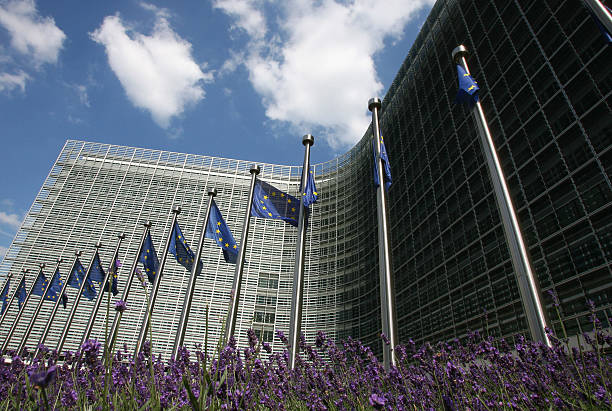
The EU is about to flex its muscles with Britain and the US

Military historians the world over have observed the folly of trying to fight a war on two fronts.
It didn’t work for Hitler, or for the great military tactician Napoleon. Yet this is the position the European Union (EU) now finds itself in.
Not only must Brussels contend with a partner determined to break away, and in doing so threatening the stability of the union, but it must also now deal with the prospect of trade tariffs being levelled against it by the largest economy in the world, necessitating a response.
The EU has already responded robustly – and as expected – to Britain’s somewhat hopeful negotiating position outlined by Theresa May ten days ago.
But it will now have to find a way to respond to the steel and aluminium tariffs imposed by the US last Thursday.
How it does so will also pose some interesting questions for Britain.
For example, how would Britain cope in the years after Brexit if a trade war broke out? Would it be granted exemptions by one side in such a war – as have been granted by the US to Mexico and Canada – and for which is it currently applying? If it failed to acquire an exemption for its industry, what redress could it seek in the international courts? Would it simply be ignored?
Why we are even talking about a potential trade war between the EU and the US is simple.
The economies of the EU and US are roughly comparable in size, give or take a couple of trillion dollars. So, the imposition of tariffs between either side are likely to be damaging for both.
Trade war
But how much more damaging are such tariffs likely to be for countries outside the EU or the North American Free Trade Area (Nafta)?
As any trade negotiator will tell you, negotiations over trade deals are essentially about access to markets and size: the bigger your market, the greater your level of access.
The US is famed for walking into trade negotiations presenting smaller potential trade partners with a list of demands and then essentially walking away telling such smaller partners to take the deal or leave it. It can do this because it is the world’s largest consumer market.
But the EU is the largest free trade area in the world, and arguably the second, or, at worst, the third largest consumer market in the world, so it doesn’t have to simply accept US “take it or leave it” tactics. It can, and would be likely to, retaliate.
Brexit
Britain, however, is being forced to appeal to the White House to save a domestic steel industry already on its knees, partly as a result of foreign ownership and partly because of cheap Chinese steel imports. This is just a microcosm of the difficulties Britain will face after Brexit.
The same market access and size principles apply to the EU’s robust response to Britain’s negotiating position on trade. It has the bigger market and Britain will continue to need access to it after Brexit.
The British economy is powered by its service sector – a huge part of which is financial services – and the majority of Britain’s exports go to Europe.
Preventing Britain’s financial services industry from accessing the single market – as Brussels has said it must do to preserve the integrity of the union – would further underline Britain’s loss of influence and power. And it hasn’t even left the EU yet.
There is a both a free trade and protectionist principle at work behind the concept of Margaret Thatcher’s invention of the Single Market.
Both principles are quite simple to understand. Together Europe’s members are stronger both economically and politically.
Together they are protected and are able to withstand the global forces of China and the US, or one day India, all of could individually dominate the 21st century.
The EU provides a counterweight to either US or Asian hegemony.
Outside the EU, Britain will simply be another small country shouting from the back of the room desperate to be heard, as a trade war between the US and EU could be about to demonstrate.
To find out how INFINOX Capital can help you reach your financial goals, visit www.infinox.com